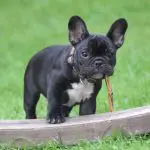Hip dysplasia in dogs advice
Hip dysplasia is the most common cause of osteoarthritis in young dogs. It is mainly an inherited condition and it is where the ball and socket joint of the dog don’t fit together properly due to a loose joint. This then leads to other changes such as osteoarthritis and pain. Some dogs will have no signs where as others will be severely debilitated.
If a bitch or dog that has hip dysplasia but no signs of the disease goes on to have puppies, the pups may show severe signs. It is therefore essential that bitches and dogs have x-rays and a good “hip score” before breeding to make sure there is less risk of producing affected puppies.
The acceptable score varies from breed to breed. Your vet will be able to take x-rays and send them away for scoring by the BVA/ KC (British Veterinary Association/ Kennel Club). These x-rays need to be perfectly straight with the dog on its back and are thus taken under general anaesthetic.
If my young dog has hip dysplasia what can I do to help?
– Manage the diet. It is vital the growing dog doesn’t grow too fast or too slowly and is fed a diet appropriate for the breed and age.
– Overweight dogs are at high risk and may develop more severe symptoms.
– Exercise carefully. It should be carefully controlled. Ask your vet your advice.
– Pain relief. Ask your vet! N.B. human pain killers are poisonous to dogs!
– Surgery. Hip replacements can be performed at specialist centres when dog fully grown.
– Physiotherapy
– Swimming
Please ask advice from your vet before changing diet or exercise of your pet.
My old dog has hip dysplasia what can I do to help?
– Make sure your old dog is not overweight as this will put a great strain on the already suffering joints. If your dog is overweight consult your vet as he or she will need careful monitoring throughout the diet. A special food may be indicated which is filling and has all the essential nutrients but less calories.
– Joint supplements containing glucosamine and condroitin may help.
– Careful exercise. Little and often is best and don’t be tempted to overdo it at the weekend. Your old pet simply isn’t up to it any more!
– Swimming and physiotherapy
– Pain relief may be prescribed by your vet
If your pet is still in pain despite the above then surgery may be an option. You should also consult with your vet before changing your pet’s diet and exercise regime.


